Related Research Articles

Catalan is a Western Romance language. It is the official language of Andorra, and an official language of three autonomous communities in eastern Spain: Catalonia, the Balearic Islands and the Valencian Community, where it is called Valencian. It has semi-official status in the Italian comune of Alghero, and it is spoken in the Pyrénées-Orientales department of France and in two further areas in eastern Spain: the eastern strip of Aragon and the Carche area in the Region of Murcia. The Catalan-speaking territories are often called the Països Catalans or "Catalan Countries".

Valencian or the Valencian language is the official, historical and traditional name used in the Valencian Community of Spain to refer to the Romance language also known as Catalan, either as a whole or in its Valencia-specific linguistic forms. The Valencian Community's 1982 Statute of Autonomy and the Spanish Constitution officially recognise Valencian as the name of the regional language.

The Catalan Countries are those territories where the Catalan language is spoken. They include the Spanish regions of Catalonia, the Balearic Islands, Valencian Community, and parts of Aragon and Murcia (Carche), as well as the Principality of Andorra, the department of Pyrénées-Orientales in France, and the city of Alghero in Sardinia (Italy). It is often used as a sociolinguistic term to describe the cultural-linguistic area where Catalan is spoken. In the context of Catalan nationalism, the term is sometimes used in a more restricted way to refer to just Catalonia, Valencia and the Balearic Islands. The Catalan Countries do not correspond to any present or past political or administrative unit, though most of the area belonged to the Crown of Aragon in the Middle Ages. Parts of Valencia (Spanish) and Catalonia (Occitan) are not Catalan-speaking.

La Franja is the area of Catalan-speaking territories of eastern Aragon bordering Catalonia, in Spain. It literally means "the strip" and can also more properly be called Franja d'Aragó, Franja de Ponent or Franja Oriental d'Aragó in Catalan.
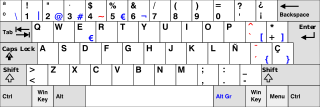
The majority of languages of Spain belong to the Romance language family, of which Spanish is the only one with official status in the whole country. Others, including Catalan/Valencian and Galician, enjoy official status in their respective autonomous regions, similar to Basque in the northeast of the country. A number of other languages and dialects belonging to the Romance continuum exist in Spain, such as Aragonese, Asturian, Fala and Aranese Occitan.

Valencian Sign Language, or LSV, is a sign language used by deaf people in the Valencian Community, Spain. It is closely related to Catalan Sign Language (LSC); they are variously described as similar languages or as dialects of a single language.

Spanish Sign Language is a sign language used mainly by deaf people in Spain and the people who live with them. Although there are not many reliable statistics, it is estimated that there are over 100,000 speakers, 20-30% of whom use it as a second language.
The names of the Valencian Community are diverse, even though Comunitat Valenciana is the only denomination with official status in its Statute of Autonomy. Nonetheless, this legal document includes in its Preamble other legal denominations that portray the history and nature of the territory: Regne de València and País Valencià.
Blaverism is a Valencian regionalist ideology in the Valencian Community (Spain) that emerged with the Spanish transition to democracy characterised by strong anti-Catalanism, born out of its opposition to Joan Fuster's book Nosaltres, els valencians (1962), which promoted the concept of the Catalan Countries which includes Valencia. They consider Fuster's ideas as an imperialist Catalan nationalist movement that tries to impose Catalan domination upon Valencia. Blaverism takes its name from the blue fringe which distinguishes the Valencian flag from other flags with a common origin, particularly from the Catalan.
Bernard Weish or Bernard Weiss was a purported fictional linguist who has been cited as an authority to support theories on the differences between the Valencian and Catalan languages. There is speculation that the character was created either by proponents of Language secessionism such as the Blaverists to bolster their arguments, or by those who oppose secessionism / to mock it.
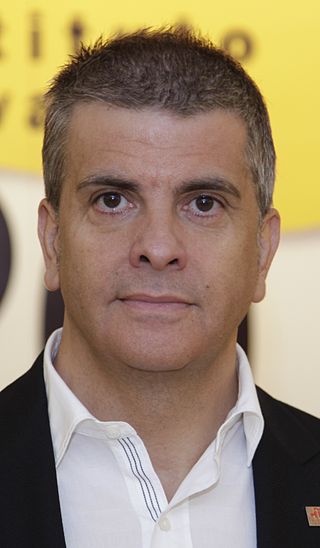
Francisco Moreno-Fernández is a Spanish dialectologist and sociolinguist.
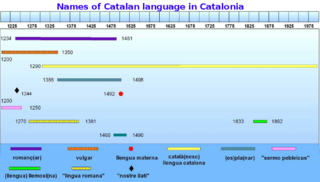
The first names, or glossonyms, of the Catalan/Valencian language formed in a dialectal relation with Latin, in which Catalan existed as a variety. These names already expressed the relationship between the two languages. New names that related Catalan to Rome came about to dignify the Catalan language in the thirteenth century, though Latinists called it vulgar and the people planus, or pla.
Valencian nationalism or Valencianism is a political movement in the Valencian Community, Spain.
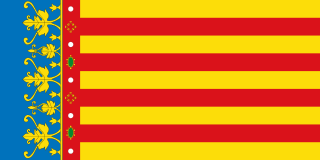
The Valencian Community is an autonomous community of Spain. It is the fourth most populous Spanish autonomous community after Andalusia, Catalonia and the Community of Madrid with more than five million inhabitants. Its homonymous capital Valencia is the third largest city and metropolitan area in Spain. It is located along the Mediterranean coast on the east side of the Iberian Peninsula. It borders Catalonia to the north, Aragon and Castilla–La Mancha to the west, and Murcia to the south, and the Balearic Islands are to its east. The Valencian Community is divided into three provinces: Castellón, Valencia and Alicante.
Rafael Lluís Ninyoles i Monllor was a Spanish sociolinguist, considered one of the parents of Catalan sociolinguistics along with Lluís Vicent Aracil i Boned.

The Catalan language originated from Vulgar Latin in the Pyrenees Mountains between France and Spain. It diverged from the other Romance languages in the 9th century. At that time, Catalan spread quickly throughout the Iberian peninsula when the Catalan counts conquered Muslim territory. By the 11th century, the Catalan language was present in several feudal documents. Catalan was present throughout the Mediterranean by the 15th century. At that time, the city of Valencia was thriving.

The Resolution concerning principles and criteria for protecting the name and identity of Valencian is a normative resolution made by the Acadèmia Valenciana de la Llengua in 2005.
There is a variety of Vernacular languages spoken in Spain. Spanish, the official language in the entire country, is the predominant native language in almost all of the autonomous communities in Spain. Six of the seventeen autonomous communities in Spain have other co-official languages in addition to Spanish. Bilingualism in different degrees and in distinct communicative situations between Spanish and another language is a habitual practice for many of the Spanish people who reside in one of these autonomous communities.

Més, also known as Més–Compromís, is a Valencian nationalist party in the Valencian Community, Spain. It is the largest party in the Coalició Compromís since 2021, being created as a refoundation of the former Bloc Nacionalista Valencià.
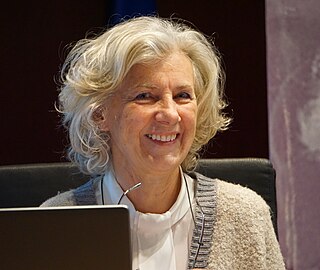
Mercedes Bengoechea Bartolomé is a Spanish feminist sociolinguist, professor of English philology and a proponent for the defense of the use of gender-neutral language from an academic foundation. She has had a long career as an advisor to various entities, including the Institute of Women and the Instituto RTVE (IORTV). Since 1994, Bengoechea has been a member of the Comisión Asesora sobre Lenguaje del Instituto de la Mujer (NOMBRA). She has been vocal at the Commission for the Modernization of Legal Language of the Ministry of Justice, as well as coordinator of the first Annual Report of the National Observatory on Gender Violence. She defends the need to implement a non-sexist use of language, in the face of resistance from institutions such as the Royal Spanish Academy (RAE). She has received various awards for her research and innovative work within her specialty.
References
- 1 2 Pardines López & Torres 2011, p. 8.
- ↑ Dictamen sobre la lengua del Consell Valencià de Cultura – Pleno extraordinario de 13 de julio de 1998
- 1 2 El model valencià de política lingüística Archived 2016-02-24 at the Wayback Machine , Anselm Bodoque
- 1 2 3 La deriva estandarditzadora valenciana. Del secessionisme rupturista a l’aïllacionisme particularista
- ↑ Lengua e ideología nacionalista en el conflicto centro-periferia. Apuntes sobre el caso español
- 1 2 3 4 5 Pardines López & Torres 2011, p. 19.
- ↑ Comunidad lingüística y conflicto lingüístico: revisión de unos términos sociolingüísticos respecto al discurso valenciano